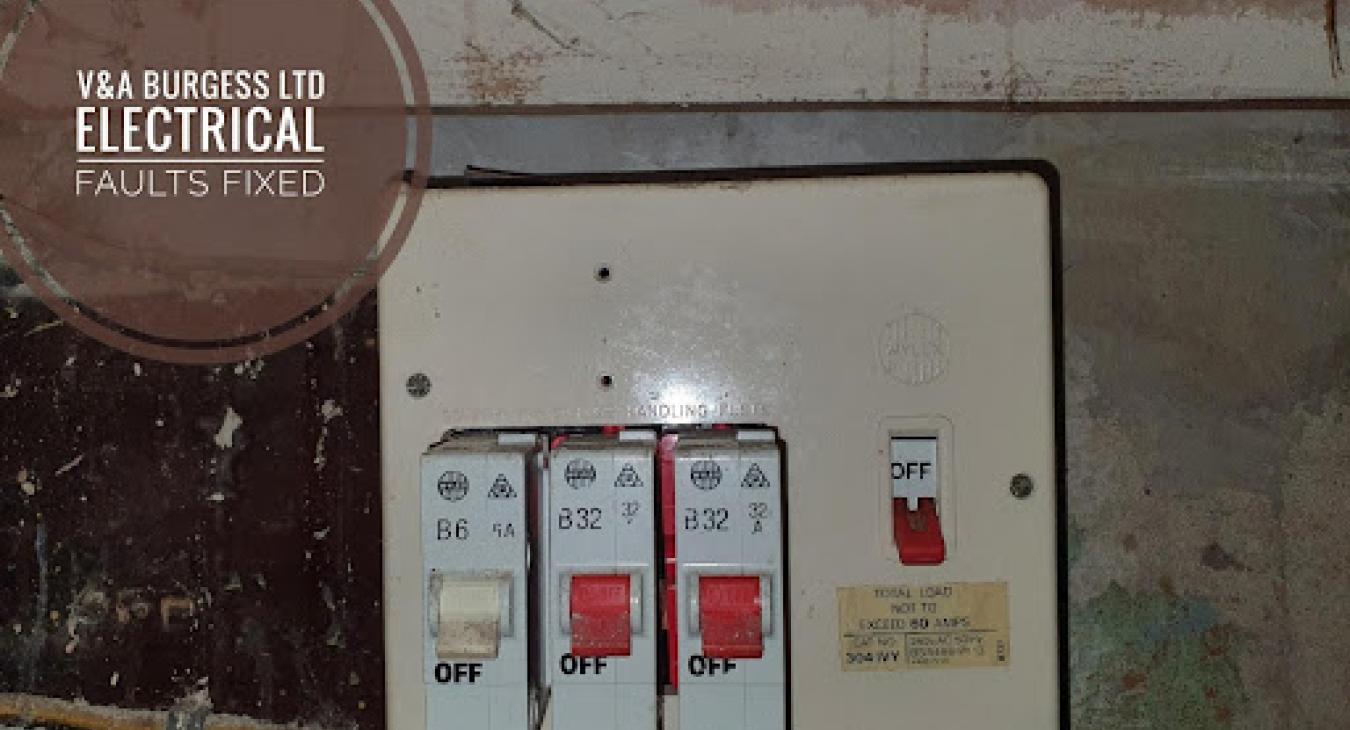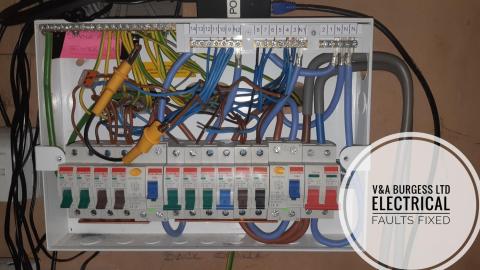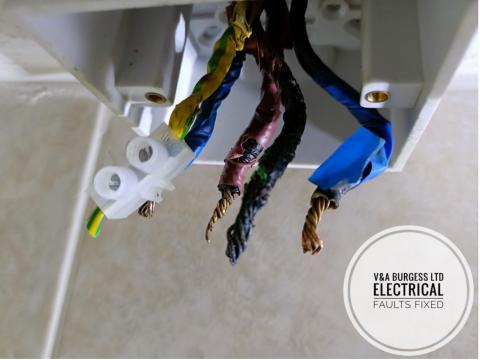
Table of Contents
- If you're searching for a solution to "blown fuse in my house", then there may be electrical problems that need addressing.
- I have no power at all in the house, what could be the problem?🤔
- What if the issue is a blown main fuse? What could cause this?🤷
- A plug fuse keeps blowing, why?💥
- The fuse in the wall switch keeps blowing…💥
- How can I know if my home electrics are okay?⚡
1) If you're searching for a solution to "blown fuse in my house", then there may be electrical problems that need addressing.
Fuses do not blow for no reason and there are often electrical issues that cause these fuses to blow.
The fuse box above has been ‘upgraded’ to circuit breaker style trip switches rather than the original fuse wire carriers that would have been installed at the time of the fuse box installation. These serve little extra purpose other than some convenience that enables the switch to be pressed up into the ‘on’ position following an electrical fault. Rewiring a fuse can be fiddly and, if done incorrectly, incredibly dangerous.
2) I have no power at all in the house, what could be the problem?🤔
If you find that there is no power at all in your home then it could be that you have a blown fuse on the mains side. In each of our homes there is electrical supply equipment that provides the electricity supply to our fuse boxes / consumer units. This supply equipment has its own specialist large fuse installed. If this fuse blows then this needs to be replaced and investigated by the local distribution network operator (DNO). The DNO can be reached on 105, they can tell you if there is a power supply problem in your area, if you are the only one currently experiencing a power cut and if they need to attend to check your supply equipment.
There are other reasons that you may have no power at all in your home such as:
- Damaged Cable in the street: The underground and overhead cables that supply our electricity can go faulty, fail at connections, and suffer from wear and tear or accidental damage outside in the street. When this happens, it can affect the power to supply to your home or yours and others.
- Main switch has tripped in the consumer unit: Some consumer units (you may know it as a fuse box) have main switches installed that trip when they detect a fault. Not all main switches will trip or are designed to. If you are unsure which type, you have then get in touch and we will help.
- Burnt out main connections: The incoming connections to your electricity meter and consumer unit can work loose over time and burn out. They can also burn out if there is a large power draw over a long period. When these main cables burn out, replacing them can be costly and time consuming for an electrician to carry out.
- Localised power cut: There could be a general power cut in the area causing issues with the power supply to your home. The best way to establish if there are local power supply issues is to give your local distribution network operator a call and ask if there are any known issues affecting the power supply to your home. You can do this by calling 105 freephone and this will put you through to your local network provider in the UK.
3) What if the issue is a blown main fuse? What could cause this?🤷
If you definitely hava a blown fuse then there is only one reason why a fuse blows and that is because too much electrical current has been flowing through it. Too much electrical current in a circuit can occur for two reasons:
- There has been an electrical fault: When a short circuit happens in an electrical circuit there is an electrical pathway of negligible electrical resistance allowing a very large current to then flow as there is no impedance to it. When this large electrical current flows, the fuse will blow very quickly. A typical 60-amp fuse for our home supply will blow in a fraction of a second when 1000 amps is allowed to flow for example.
- There is too much demand: When there is a gradual and prolonged demand on your electrical supply the fuse can blow. If you are using too many appliances and electrical items all at once then there may be too much electrical current flowing through the circuits and the main fuse in the supply equipment may eventually blow. This is a much less dramatic way in which the fuse gives out but it may still do so.
4) A plug fuse keeps blowing, why?💥
If you find that there is a plug top fuse that keeps blowing then there may be a couple of reasons for this.
You should check the wiring in the plug top is ok. You can do this by firstly removing the plug from the wall socket and then, using a screwdriver, undo the central screw in the plug that holds it together. Once the case is removed, check that the wiring is neat, not frayed and well terminated into each of the plug pins. If the wiring is ok, check the fuse is the right size for the appliance. It’s important that the fuse is not too small for the appliance, if this is the case then the fuse will regularly blow or the plug will overheat as the appliance demands more electrical current than the fuse will allow to pass through. It is also important not to use TOO LARGE a fuse in the appliance. If a larger fuse is used then the appliance cable and internal electrical parts will not be adequately protected from electrical overload and danger. This could cause a fire or electrical shock if there was an issue. The other reason an appliance may blow fuses is that the appliance itself may be faulty and this could cause the fuse in the plug top to blow. If you suspect that an appliance is faulty you can ask an electrician to confirm this for you or get an appliance engineer out to inspect and repair the appliance for you.
5) The fuse in the wall switch keeps blowing…💥
Certain electrical switches in our home have a fuse inserted into them. This is common, for example, where a conservatory has been added on to the property after it has been built. In order to get electrical power into the conservatory, it is often quick, cheap, and easy to take a fused supply from a larger circuit to then supply the conservatory. This is then usually run to the lights in the conservatory and also powers the sockets. The issue that can occur when this method of wiring is used is that the conservatory power demands often overload the fuse and either melt the switch or blow the fuse. When we think about it, conservatories can get rather cold in the winter and as such people tend to want heating in there. It is far easier to plug an electric heater or two in rather than getting a plumber to run new pipework in for radiators so most people use electric heating. Conservatories are typically fused down to 13 amps which is simply inadequate in many circumstances for a fused spur switch. There can be other uses for 13-amp wall switches too. Another common use is an immersion element on a hot water tank. We regularly see 13-amp wall switches burn out where an immersion element is involved. If you find that your fused spur switch is blowing a fuse, check the size of the fuse in there, it may be that the fuse is too small for the electrical load being placed upon it. Do not change the fuse for a different size without consulting a qualified electrician as you may be putting the cables or appliances at risk by doing so. 😊
Back to top6) How can I know if my home electrics are okay?⚡
If you are having electrical problems in the home or you are regularly blowing fuses, tripping switches, or having other electrical issues then you need to call an electrician and explain the issues to them. In some cases, the electrician may recommend that some electrical fault finding is carried out to establish the cause for the issues that you are experiencing. If the electrician thinks it is necessary, they may recommend that you have a full electrical inspection carried out as well to establish the condition of the electrical wiring and system in your home. You can learn more about electrical inspections and what is carried out by searching our blog or checking our link on electrical safety checks https://www.electricalfaultsfixed.co.uk/electrical-safety-checks-eicr.
📞 01925 595 980 (Warrington)
📞 0151 351 4011 (Liverpool)
📧 Enquire online
💻 Visit our website
Back to top










